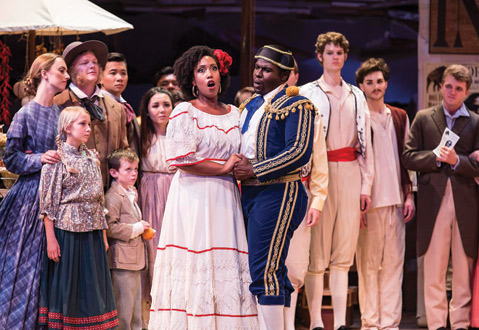Review: Carmen at the Granada Theatre
Music Academy of the West Performed Georges Bizet’s Opera on August 1

Capping a renaissance year and honoring the 80th birthday of vocal teacher Marilyn Horne, the Music Academy of the West (MAW) chose to stage for its 2014 opera production one of the most perfect musical theater pieces of all time and certainly one of the most popular. Georges Bizet’s brilliant themes, coupled with his psychologically masterful orchestrations, are as bewitching as the allure of the title character, Carmen. These melodies have a way of getting into your soul and lodging in the memory for hours, days afterward. But patrons were game for beguilement on this sold-out opening night. With the opera scheduled during Old Spanish Days, director David Paul and his designers alighted on a novel idea for the setting: Santa Barbara and its mountains, circa 1850, instead of Seville. After all, our own history amalgamates westward migrants searching for freedom, Mexican culture with its cherished regard for bullfighting, and streams of Romani peoples displaced from Europe. The opening curtain drew approving murmurs and instant applause for an awesome spectacle: rocky heights — apparently modeled from La Cumbre Peak and its companions — set against a luminous sky over an adobe and red-tiled village.
But more important was the aural backdrop, delivered with finesse by members of the Academy Festival Orchestra under the direction of conductor James Gaffigan. Bizet’s extensive emotional range was rendered vivid and vital throughout, especially during the ponderous trombone-laden “Fate” theme, the whimsical delicacy of “Avec la garde montante,” and the heartbreaking tenderness of the flute-and-harp “Prelude to Act III.”
Carmen, of course, is nothing without a strong title character, and Baltimore native Briana Hunter, new to the Music Academy this year, combined her sultry mezzo with keen acting skills to flesh out (so to speak) the seductive “untamed bird” of Seville. One of the greatest arias, “Seguidilla près des remparts de Séville,” was not only sung beautifully but also cheekily choreographed with the brazen gypsy (who’d been tied up after a cat fight) freeing her hands, toying whip-like with the strap, and finally pushing the guard into the captive’s chair at the last note. There hung the whole story in miniature. The role of Don José was magnificently sung by tenor Brett Payne. The opera is essentially a morality tale of the temptation and fall of this soldier, and Payne drew a convincing arc of development from boyish (but vulnerable) moralism to murderous torment. Even the pure love of Don José’s fiancée Micaëla, sung by Alison King, is powerless to save him. An especially soul-stirring moment occurs when Micaëla tracks her fugitive-betrothed to an outlaw hideout. Wandering alone in the dark, she broods on her predicament and prays for courage (“C’est les contrebandiers le refuge ordinaire”). King’s power in this aria was resplendent.
The chorus of Carmen, as with previous MAW summer operas, included Santa Barbara community singers. This year also involved the State Street Ballet for a village dance at the opening of Act II — a sequence, amid twilight sky and hanging lanterns, as beguiling as any



